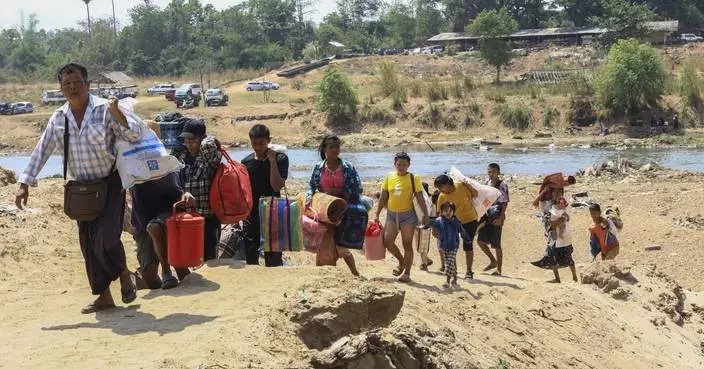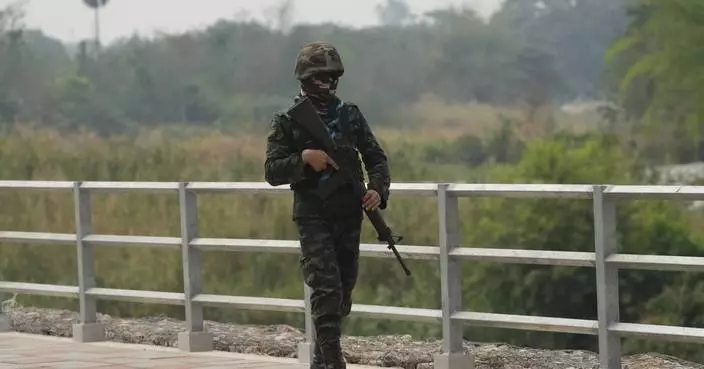It is not yet safe for the hundreds of thousands of Rohingya Muslims living in refugee camps in Bangladesh to begin returning to Myanmar, a senior United Nations official said Thursday.
While many Rohingya want to eventually return to their villages, UNICEF deputy executive director Justin Forsyth said that no one he met during visits to Bangladesh's refugee camps said they would go back now.
Click to Gallery
It is not yet safe for the hundreds of thousands of Rohingya Muslims living in refugee camps in Bangladesh to begin returning to Myanmar, a senior United Nations official said Thursday.
More than 680,000 Rohingya fled Myanmar's Rakhine state beginning in August, after Myanmar security forces began "clearance operations" in their villages in the wake of attacks by Rohingya insurgents on police posts. While most of the refugees left Myanmar in the first weeks of the crisis, Rohingya are continuing to trickle across the border into Bangladesh, complaining of mistreatment at home.
"She blames all the problems that Myanmar is having on the international media, on the U.N., on human rights groups, on other governments, and I think this is caused by the bubble that is around her, by individuals that are not giving her frank advice," Richardson, once a close friend of Suu Kyi, said Wednesday in an interview with The Associated Press in Yangon, Myanmar's largest city.
"I'm not going to be part of it because I think there are serious issues of human rights violations, safety, citizenship, peace and stability that need to be addressed," said Richardson, who often works as an international troubleshooter. "I just felt that my advice and counsel would not be heeded."
Gradual repatriations of Rohingya were to begin Tuesday under agreements signed by Myanmar and Bangladesh, but Bangladeshi officials delayed the returns at the last minute, saying more time was needed amid questions about safety and whether the refugees were returning voluntarily.
"This moment is not safe to go back," he said. "We have to improve the security situation inside Myanmar to send them back."
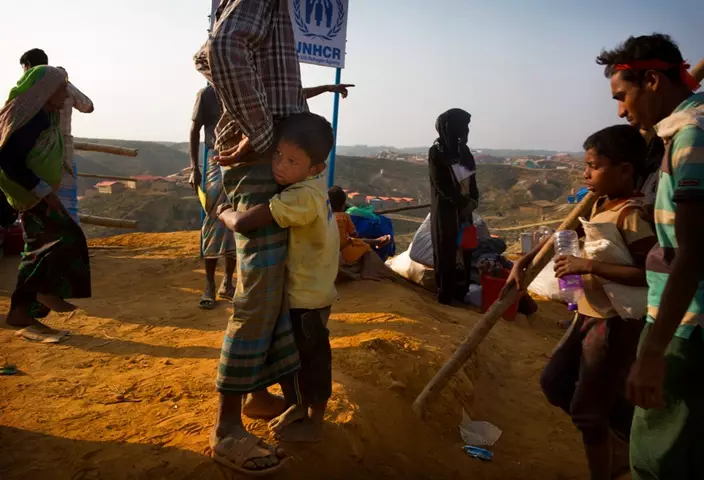
A Rohingya refugee boy who was staying in no-man's land at Bandarban between Myanmar and Bangladesh border, clings to his father after arriving at Balukhali refugee camp 50 kilometres (32 miles) from, Cox's Bazar, Bangladesh Wednesday, Jan. 24, 2018. (AP Photo/Manish Swarup)
More than 680,000 Rohingya fled Myanmar's Rakhine state beginning in August, after Myanmar security forces began "clearance operations" in their villages in the wake of attacks by Rohingya insurgents on police posts. While most of the refugees left Myanmar in the first weeks of the crisis, Rohingya are continuing to trickle across the border into Bangladesh, complaining of mistreatment at home.
Forsyth spoke one day after former New Mexico Gov. Bill Richardson resigned suddenly from an advisory panel on the crisis, calling it a "whitewash and a cheerleading operation" for Myanmar leader Aung San Suu Kyi.
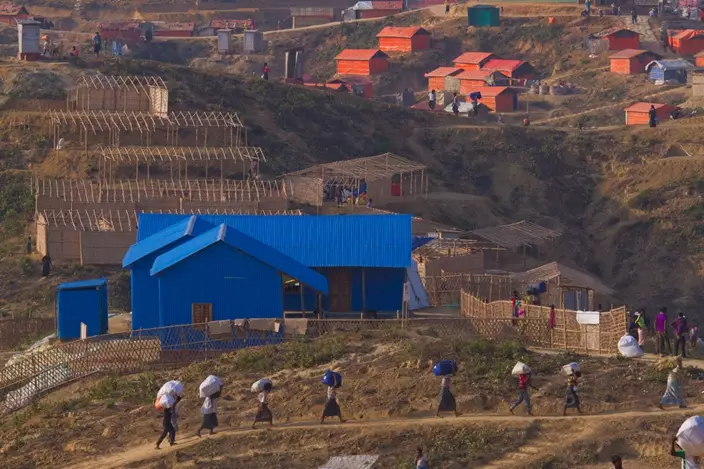
Rohingya refugee Muslims who were staying in no-man's land at Bandarban between Myanmar and Bangladesh border carry their belongings to new locations after arriving at Balukhali refugee camp 50 kilometres (32 miles) from, Cox's Bazar, Bangladesh Wednesday, Jan. 24, 2018. (AP Photo/Manish Swarup)
"She blames all the problems that Myanmar is having on the international media, on the U.N., on human rights groups, on other governments, and I think this is caused by the bubble that is around her, by individuals that are not giving her frank advice," Richardson, once a close friend of Suu Kyi, said Wednesday in an interview with The Associated Press in Yangon, Myanmar's largest city.
Richardson said Suu Kyi appeared to want the 10-member international advisory group, one in a string of Rohingya commissions set up by the Myanmar government, to endorse her policies.
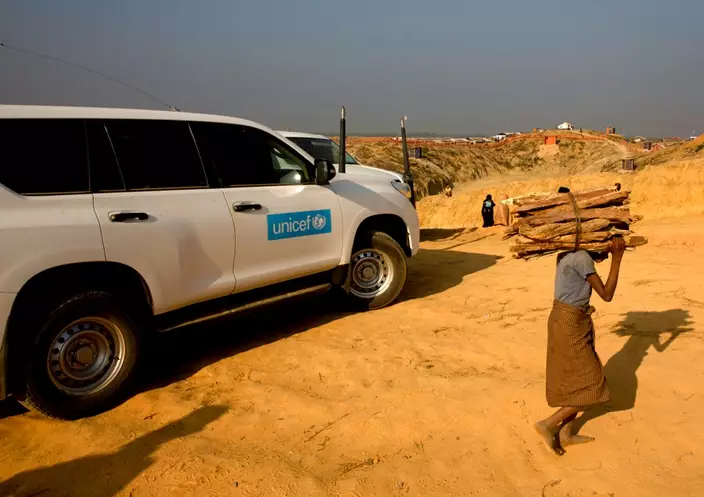
A Rohingya refugee carrying firewood on his shoulder walks past a UNICEF official vehicle at Balukhali refugee camp 50 kilometres (32 miles) from, Cox's Bazar, Bangladesh Wednesday, Jan. 24, 2018. Rohingya Muslims who fled persecution in Myanmar say some of them had returned home several times over past decades, and they're in no mood to repatriate again. (AP Photo/Manish Swarup)
"I'm not going to be part of it because I think there are serious issues of human rights violations, safety, citizenship, peace and stability that need to be addressed," said Richardson, who often works as an international troubleshooter. "I just felt that my advice and counsel would not be heeded."
Forsyth said he didn't know the details of the resignation but that "I understand his frustration."
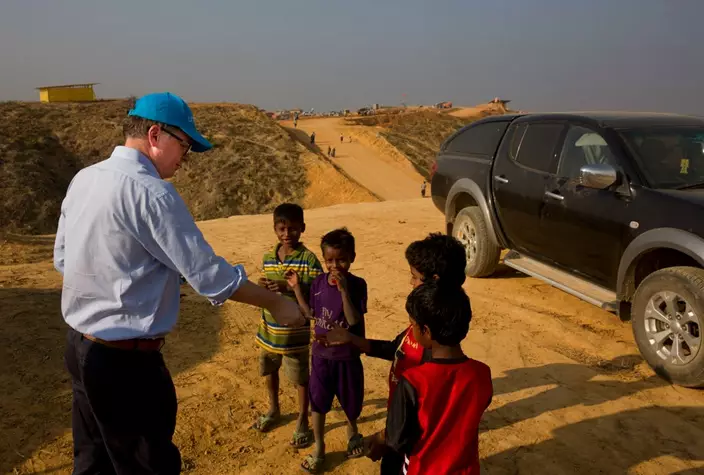
UNICEF Deputy Executive Director Justin Forsyth, left, shares biscuits with Rohingya refugee children as he leaves Balukhali refugee camp 50 kilometres (32 miles) from, Cox's Bazar, Bangladesh Wednesday, Jan. 24, 2018. Forsyth is on a two day visit to Cox's Bazar to see, first-hand, the devastating humanitarian situation of the Rohingya refugees. (AP Photo/Manish Swarup)
Gradual repatriations of Rohingya were to begin Tuesday under agreements signed by Myanmar and Bangladesh, but Bangladeshi officials delayed the returns at the last minute, saying more time was needed amid questions about safety and whether the refugees were returning voluntarily.
Forsyth urged Myanmar authorities to allow international organizations access to all the areas affected by the crisis.
Rohingya have long faced repression in Myanmar. They are widely dismissed as having migrated illegally from Bangladesh and are denied some of the most basic rights, including the freedom of movement. In 1982, nearly all Rohingya were stripped of their citizenship rights.

UNICEF Deputy Executive Director Justin Forsyth, left, looks at one of the sprawling Balukhali Rohingya refugee's camp, 50 kilometres (32 miles) from, Cox's Bazar, Bangladesh Wednesday, Jan. 24, 2018. Forsyth is on a two day visit to Cox's Bazar to see, first-hand, the devastating humanitarian situation of the Rohingya refugees. (AP Photo/Manish Swarup)
Allergy season can bring misery to tens of millions of Americans each year.
Tree, grass, and other pollens can cause runny noses, itchy eyes, coughing and sneezing.
Where you live and what you're allergic to can make a big difference in how bad your allergies are, but there are many things you can do to feel better.
Here are some tips from experts to keep allergies at bay — maybe even enough to allow you to enjoy the outdoors.
There are three main types of pollen. Earlier in the spring, tree pollen is the main culprit. After that grasses pollinate, followed by weeds in the late summer and early fall.
Some of the most common tree pollens that cause allergies include birch, cedar, cottonwood, maple, elm, oak and walnut, according to the Asthma and Allergy Foundation of America. Grasses that cause symptoms include Bermuda, Johnson, rye and Kentucky bluegrass.
The best and first step to controlling allergies is avoiding exposure. That’s easier said than done when it's nice out.
Start with keeping your windows closed at home and in the car, avoiding going out when pollen counts are highest and changing clothes when you get home. The same masks that got us through the pandemic can protect you from allergies — though they won't help with eye symptoms.
Pollen trackers can help with planning. The American Academy of Allergy Asthma and Immunology tracks levels through a network of counting stations across the U.S. Counts are available at its website and via email.
You can't fight an enemy you don't know.
Since many Americans are allergic to several things at once, the first thing to figure out is what specifically you’re allergic to, said Dr. Nana Mireku, an allergist in the Dallas-Fort Worth area.
Over-the-counter nasal sprays can help relieve symptoms, but they take a while to kick in, so it’s best to start them in early in the season, said Dr. Rachna Shah, an allergist and director of the Loyola Medicine Allergy Count.
Antihistamines are another option. Shah said she’s seen some patients benefit from switching to a similar brand if one stops working, but said that there isn’t much broader data to back the recommendation.
For young children and people who have to take many different allergy medications, immunotherapies in the form of shots and oral drops can help desensitize the immune system to allergens, treating symptoms at their root.
The Asthma and Allergy Foundation of America issues an annual ranking of the most challenging cities to live in if you have allergies, based on over-the-counter medicine use, pollen counts and the number of available allergy specialists. This year, the top five were Wichita, Kansas; Virginia Beach, Virginia; Greenville, South Carolina; Dallas; and Oklahoma City.
If you've been thinking it started earlier and seems longer this year, you're on to something.
Shah usually starts looking at pollen counts in the Chicago area in April. But this year, she peeked at her data in mid-February, and tree pollen was already at a “moderate” level.
“This season has been so nuts,” she said. “Granted, it was a pretty mild winter, but I didn’t expect it to be so early.”
Shah said she believes this season will be longer than other years, assuming the weather remains warm.
Experts say climate change has led to longer and more intense allergy seasons.
The Associated Press Health and Science Department receives support from the Robert Wood Johnson Foundation. The AP is solely responsible for all content.
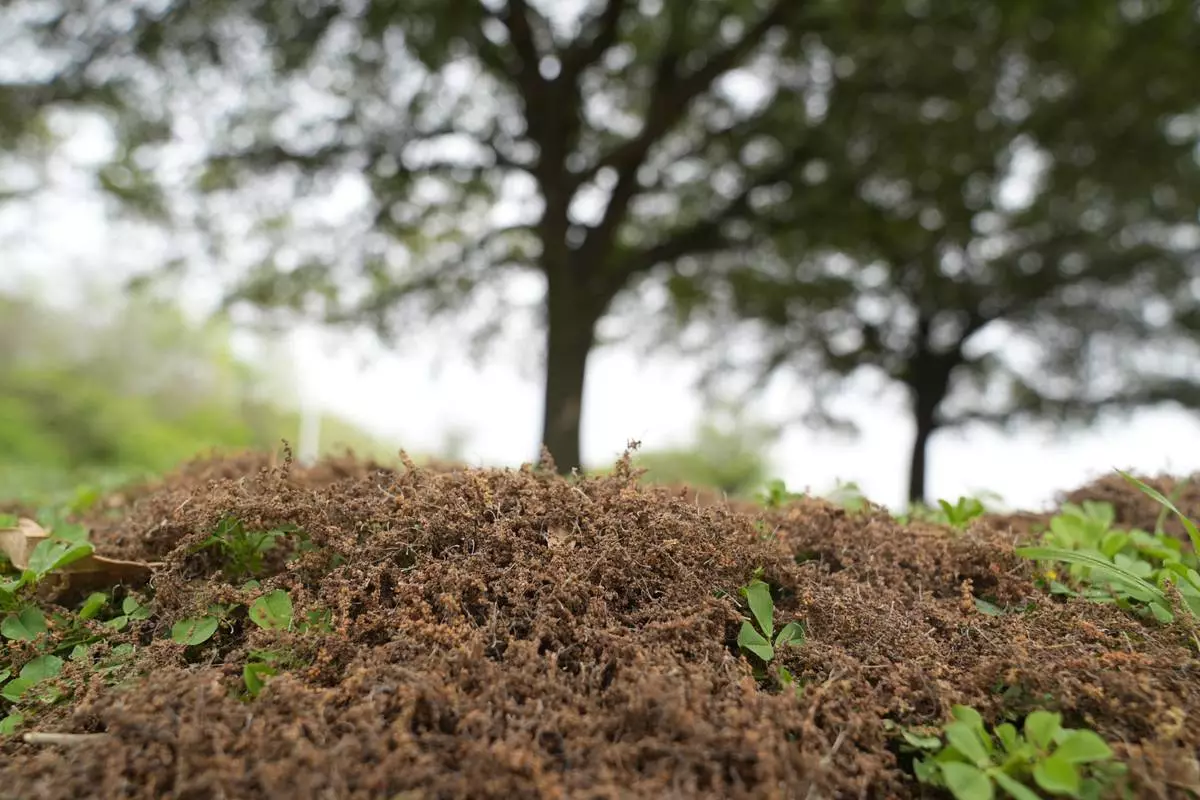
FILE - Tree pollen pods lay in a pile at a park in the Dallas suburb of Richardson, Texas, Thursday, March 21, 2024. The Asthma and Allergy Foundation of America issues an annual ranking of the most challenging cities to live in if you have allergies, based on over-the-counter medicine use, pollen counts and the number of available allergy specialists. In 2024, the top five were Wichita, Kansas; Virginia Beach, Virginia; Greenville, South Carolina; Dallas; and Oklahoma City. (AP Photo/LM Otero, File)
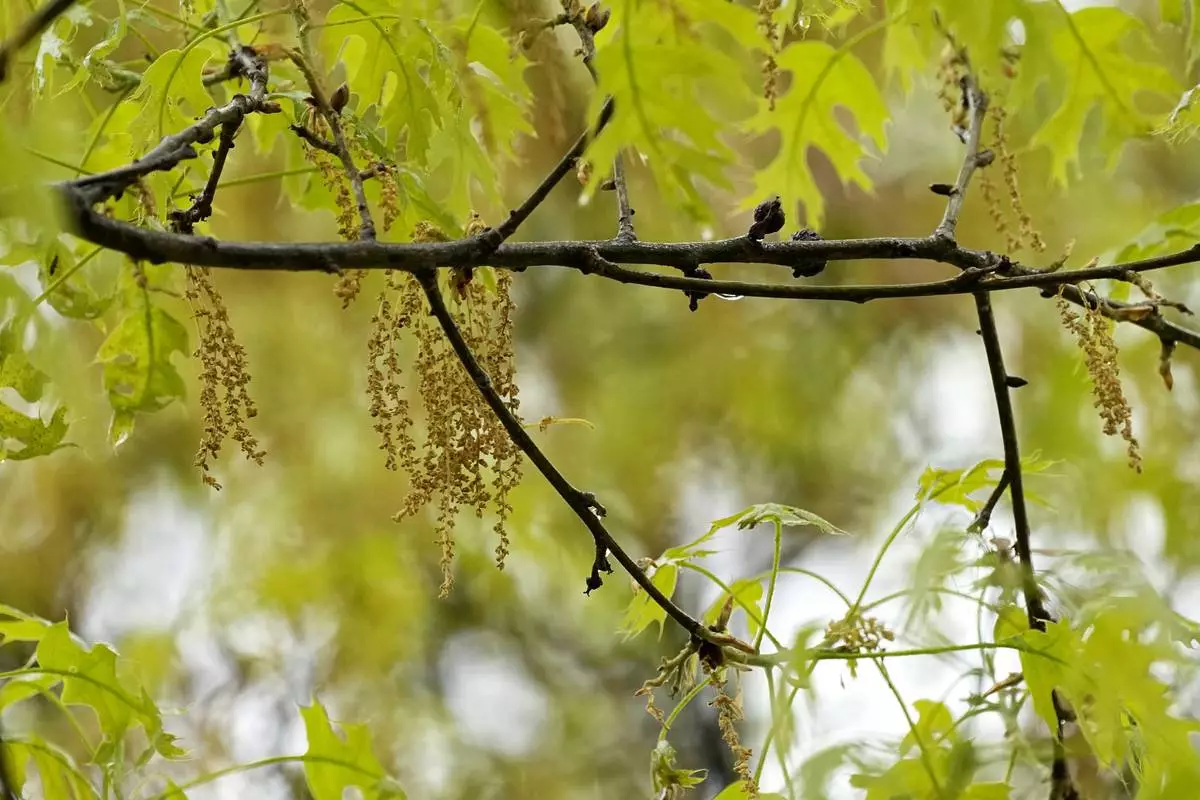
FILE - An oak tree with new leaf growth also shows pollen and a drop of water hanging among the branches at a park in Richardson, Texas, Thursday, March 21, 2024. There are three main types of pollen. Earlier in the spring, tree pollen is the main culprit. After that grasses pollinate, followed by weeds in the late summer and early fall. (AP Photo/Tony Gutierrez, File)











